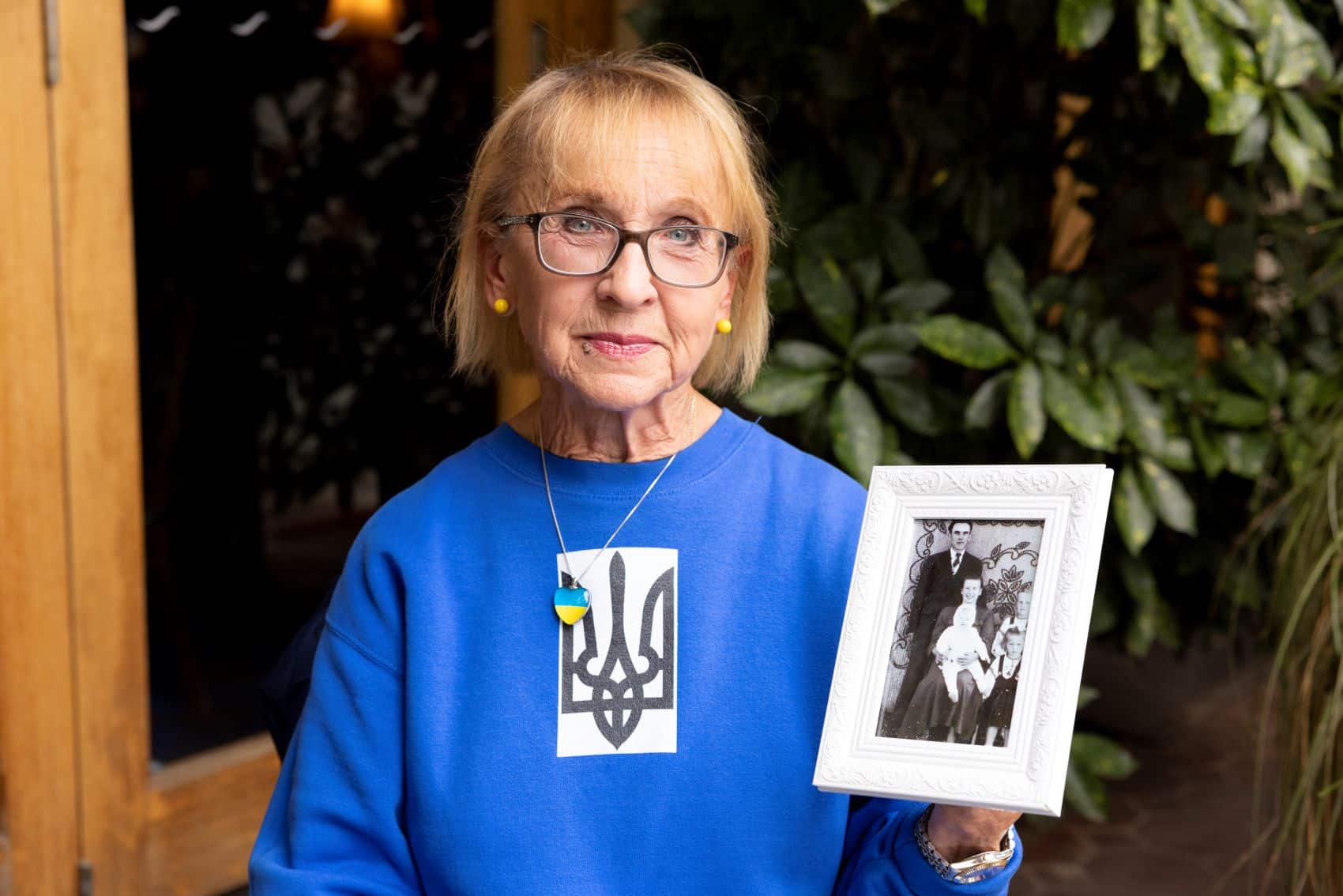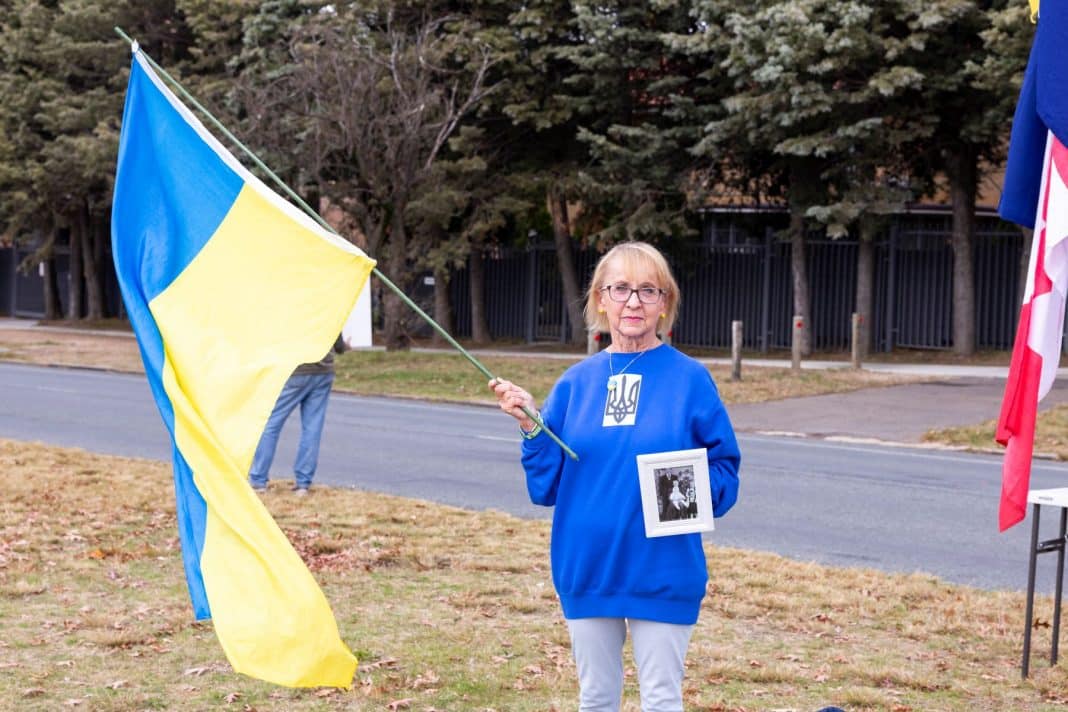If you drive through Manuka at lunchtime on a weekday or Saturday, you will likely see a group of passionate locals supporting friends, family and strangers in Ukraine. For the past 14 months, they have been ensuring that the Russian Invasion of Ukraine stays at the forefront of our minds while calling for more action.
This Saturday, they are joined by Baltic community members outside the Russian Federation’s Embassy in Griffith to protest child deportation.
“There are so many aspects of the war that you have to find a spot for … This year, I wanted each month to have a specific focus,” says observation co-coordinator, Marusya Jacyshyn. “We just want people to remember that there are so many [children] that have been forcibly abducted, kidnapped, abducted – whatever adjective we want to use.”
Both historic and current deportation issues will be acknowledged on the day. The Baltic communities joining them – Latvia, Lithuania, and Estonia – commemorate the June Deportation on 4 June each year. The 1941 tragedy saw tens of thousands of people removed from their homes, with men being sent to prison camps, and women and children into forced resettlement in Siberia, Russia and the surrounding Stan countries. Wanting to stand by their Ukrainian neighbours, they asked to join their commemoration this Saturday.
The current forced removal of Ukrainian children can be traced back to 2014, however, the continuing Russian invasion has exacerbated the number of children being taken across the border. Ukraine’s National Information Bureau estimates nearly 20,000 children have been removed since the beginning of the war in February 2022.
“They’ve been told that they’ve got a new name, you’re not allowed to speak Ukrainian anymore, you’re not allowed to talk about your family. They bring three families, and they say you choose which of those three you want to live with. I can’t imagine the trauma of that even now if someone said that to me,” Ms Jacyshyn says.
The children are generally aged between four and 14; Ms Jacyshyn explains, older than that, while they are still scared, they are more likely to refute demands. She is sure younger children have been taken, too, but records are incomplete due to prevailing war conditions.
“I think 345 Ukraine children have been killed … We try to remember all of the children whether they’re deported, they’re killed, they’re injured,” she says.
The lack of recognition and action from the United Nations and International Red Cross on behalf of the children has Ms Jacyshyn disappointed. She says the agreed language around warfare is outdated and leaves room for error.
“What Russians would say is ‘we’re removing them from the battlefield’; who created the war? The United Nations is really unclear about that. So, they could say ‘we’re removing you from the battlefield’; ‘well, you are, but you’re attacking my home, you’re killing my parents’.”
According to Ms Jacyshyn, the impacts of the loss of childhood and physical and psychological abuse will be felt by generations to come. In her own family, during World War II her mother was removed at 17 and forced to work on a farm.

“In my mother’s case and in the Baltic nations, it was something you didn’t really talk about the psychological effects; it would be a trauma … When I look at photos of my mother when she was taken and finished there’s just this different person that didn’t have a life.
“It’s a difficult thing to be whisked away from everything you know and love, and never to be able to return, when you’re younger there are even greater psychological scars.”
Fewer than 400 of the children taken have been returned to their families in Ukraine, Ms Jacyshyn says. While she is grateful those children have made it home, it isn’t enough.
She also acknowledges that the issue is larger than just getting them home, and says First Lady Olena Zelenska is doing a lot of work to address the long-lasting effects these children will face.
“It’s not just the deportation, they have nowhere to live and when places like Kherson were liberated last November, they found little mini torture chambers for children … There are also young girls who are now pregnant by their occupiers.
“There have been videos of a young girl who was deported and re-educated and she had to stand up and say she was so glad she was with this family,” says Ms Jacyshyn. “Imagine the trauma; she’s been re-educated, she has to stand up and say ‘I’m really glad I’m here, my other family wasn’t any good, I’m really glad I’m in Russia and I’m really glad all this happened’.”
Everyone in attendance is asked to bring a photograph of themselves or someone they know before the age of 14; collectively, everyone will take the time to pause and reflect.
“How would I at that age, if one day everything, your whole identity, is taken away, your country is taken, your parents, your siblings are taken away and that’s it; you’re just forbidden to exist as yourself,” Ms Jacyshyn says.
Supporters for the children of Ukraine will gather outside the Embassy of the Russian Federation in Australia, at Canberra Avenue, Griffith, on Saturday 10 June from 10am.
Get the latest Canberra news, sport, entertainment, lifestyle, competitions and more delivered straight to your inbox with the Canberra Daily Newsletter. Sign up here.



